Why are Australians worried about the economy?
- Published
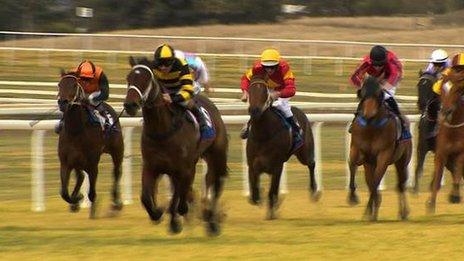
The thoroughbred industry is big business in Australia's Hunter Valley
In the small town of Scone in New South Wales, people are enjoying a day at the races.
The race course sits on the wide grassy plains that stretch out among the hills of the Upper Hunter Valley. On a bright winter's day, it is a beautiful spot and there is a fair crowd enjoying a few beers, a burger and a bet.
Amid the waft of the fast food cart, there is that unmistakable aroma of horse, as sleek and muscular colts and fillies thunder around the track.
The Hunter Valley is a prosperous region. It has been at the heart of Australia's economy, which to the envy of the world, has enjoyed more than two decades of consecutive growth.
So in the run up to the election, you'd think the punters here should be feeling lucky, right? Think again.
"Australians have got it tough at the moment," said Geoffrey Martin, who runs a butchers shop. "I've been in business for 28 years and it's as tough as I've ever seen it."
Geoffrey Martin is not the only one at the racecourse with a long face.
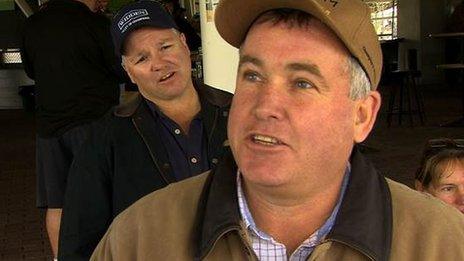
Geoffrey Martin has run a butcher shop for 28 years
"The average Australian right now is on the ropes. Mr and Mrs Joe Average are really, really hurting," said Bob Scott, decked out in a fetching blue and green tartan flat cap, peering through a set of binoculars.
"This country needs a change. It might not be any better, but it can't be any worse," chips in another man, who runs a printing business.
'Eggs in one basket'
Such sentiments might come as a surprise for outsiders. After all, Australia is a country which has been one of the few in the industrialised world to avoid the global financial crisis.
In the run-up to the election, which pits between the Prime Minister Kevin Rudd and his governing Labor Party against Tony Abbott and his conservative opposition coalition, it is economic worries that have dominated the campaign.
So why aren't Australians feeling like winners? One of the reasons is the slowdown, if perhaps not the end, of the so called "mining boom".
In the Hunter Valley, it is coal that has been the dominant industry.
Just a short drive away from the racecourse, you can see the huge craters, hundreds of metres deep and kilometres wide, where open cast mines have cut coal out of the hillsides in breathtaking quantities, literally reshaping the landscape.
The bulk of the coal has been rolled out for export towards China. But as demand there has fallen, thousands of jobs in Australia have been lost.
Some in the Hunter Valley feel there has been an overdependence on mining.
"All the eggs in one basket is an accurate representation," said Cameron Collins, who runs the Hunter Thoroughbred Breeders Association.
He acknowledges that the coal mining industry is an important plank of both the Australian economy and especially the New South Wales economy, but says the country has relied too heavily on its mineral wealth.
"Any economy needs a broad range of other industries that will continue and don't go through the boom-and-bust cycle that the mining industry goes through."
'Market share lost'
Mr Collins perhaps has an interest in criticising the mining sector. The thoroughbred industry is also big business in Hunter Valley. Along with Newmarket in the UK and Kentucky in the United States, its one of the world's three biggest breeding areas.
The industry has often been in conflict with the mining companies over the environmental damage that mining has caused.
But there are other businesses in the region that have also not entirely welcomed the mining boom.
The Hunter Valley is not just coal and horse country. It is wine country too. There are hundreds of vineyards that rely on exports and tourism to turn a profit.
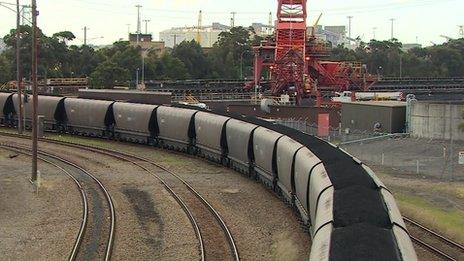
Coal has been the dominant industry in Australia's Hunter Valley
Both were damaged by the mining boom, which forced up the value of the Australian dollar, pushing up prices for foreign buyers and visitors.
James Agnew, who owns the Audrey Wilkinson vineyard, says the Australian wine brand has been damaged.
"Certainly, initially, our success was built on the sunshine-in-a-bottle cheap and cheerful, good value kind of wine. When the Australian dollar went up, the good value and the cheap aspects fell away very quickly," said Mr Agnew.
"Australian wine has lost market share significantly in its key markets of the UK, the US and Canada."
'Keep afloat'
And the mining boom pushed up prices at home too.
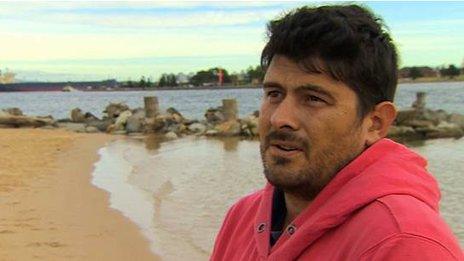
Garth Herbert lost his job in the mining sector
"Electricity is the worst. I think prices must have gone up 200% in the last few years," said Garth Herbert, who I meet along the waterfront in Newcastle, the big coal port at the mouth of the Hunter River.
Mr Herbert lost his job in the mining sector two years ago. Like many Australians, he complains that the high earners in the mining industry pushed up prices for everyone else.
Many people will tell you that cost of living is a big issue in this election, with Australian cities now among the most expensive in the world to live.
"It seems like the government thinks everybody's on A$150,000 a year when in actual fact wages are more like 40,000 to 60,000," said Mr Herbert.
"It makes things really hard, especially when you've got a young family and there's only one person in the household working. It's hard just to keep afloat. The economy's absolutely shot."
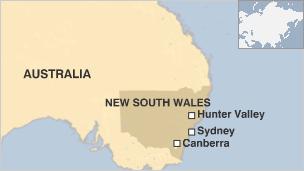
Of course, these things are relative. The boom in mining may be over, but coal and other minerals are still being exported in considerable quantities.
As Mr Herbert strolls along the beach with his two young children, a huge coal container ship as long as three football pitches slowly powers out to sea. China is the most likely destination.
But the Australian economy and mining specifically has definitely slowed down.
Back at the race course in Scone, many people told me they know that compared to other countries, things are not too gloomy.
But in deciding how to vote, many Australians are not making that comparison. They're remembering the really good times here of a few years ago - and the comparison is not a favourable one.
The question the opposition leader Tony Abbott has been asking Australians for much of this campaign has been: "Do you think you are doing better than six years ago, when Labour came to power?"
Meanwhile Prime Minister Kevin Rudd's message is not so simple. To paraphrase, it boils down to: "Look, I know we're not doing as well as a few years back, but think how much worse it could have been".
Tony Abbott's is perhaps easier for voters to identify with. It is one of the reasons why opinion polls suggest it looks increasingly likely that Australia is set to get a change of government.